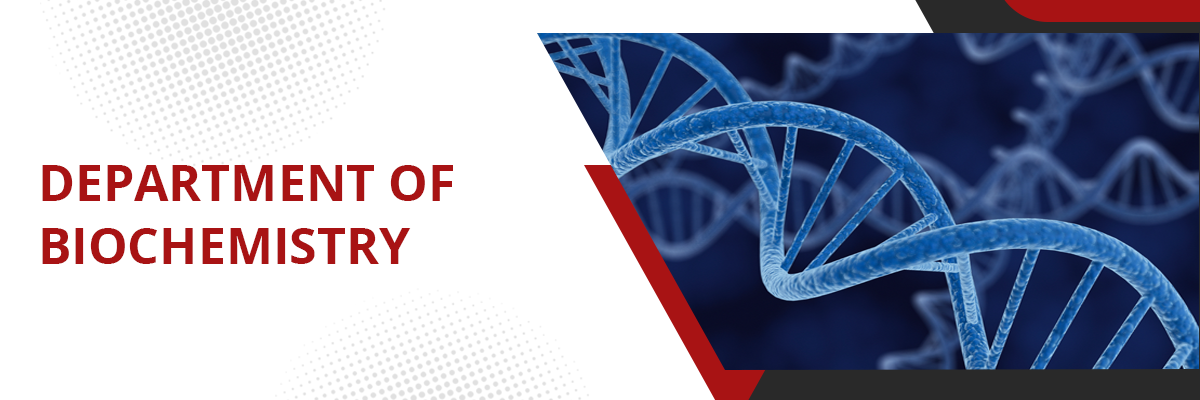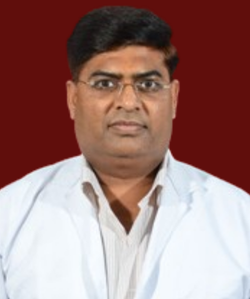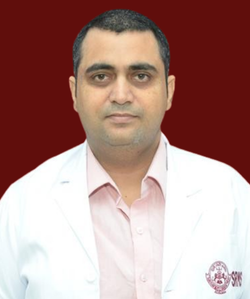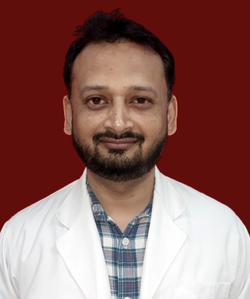
About
The Department is engaged in teaching of undergraduate and postgraduate students with a vast curriculum. Understanding the molecular basis of life and its application to medicine is the key objective of the teaching Biochemistry. The Department has a well equipped clinical Biochemistry, Endocrine and research lab. The Biochemistry labs have auto analyzers, semi auto analyzers and other highly sophisticated equipments to perform a large battery of biochemical investigations on daily basis. The lab participates in internal and external quality control protocols to ensure accurate reporting of samples. Quality services and research promotion are the key aims of the department.
Why is it Done ?
Biochemistry services play a crucial role in modern healthcare, providing valuable insights into the biochemical processes occurring within the human body. These services are conducted in hospitals for various purposes, enabling healthcare professionals to diagnose, monitor, and treat a wide range of medical conditions. From routine check-ups to complex disease management, biochemistry services offer a comprehensive understanding of a patient’s health status at the molecular level.
Understanding Biochemistry Services:
Biochemistry services involve the analysis of biological molecules such as proteins, enzymes, hormones, and metabolites present in blood, urine, and other body fluids. These services provide quantitative and qualitative data about the body’s biochemical functions and help medical professionals make informed decisions regarding patient care.
Why Are Biochemistry Services Done?
- Diagnosis: One of the primary reasons for performing biochemistry tests is to aid in the diagnosis of various medical conditions. These tests can help identify diseases such as diabetes, kidney disorders, liver diseases, and metabolic disorders. By analyzing specific biomarkers, doctors can pinpoint abnormalities and assess organ function.
- Monitoring: Biochemistry tests are essential for monitoring the progression of chronic conditions. Regular monitoring of biochemical markers can help doctors adjust treatment plans as needed and ensure that interventions are effective. For example, patients with diabetes may undergo periodic glucose level testing to manage their blood sugar levels.
- Treatment Efficacy: Biochemistry services enable healthcare providers to evaluate the effectiveness of medical treatments. By tracking changes in biochemical markers, doctors can determine whether a specific treatment is achieving the desired results and make timely adjustments if necessary.
- Preventive Care: Biochemistry tests are also used for preventive healthcare. Through routine screenings, doctors can identify risk factors and potential health issues before they become serious. This allows for early intervention and lifestyle modifications to prevent the development of chronic diseases.
- Research and Clinical Trials: Biochemistry services play a vital role in medical research and clinical trials. Researchers rely on these tests to study the underlying mechanisms of diseases, test new therapies, and develop a deeper understanding of how the body functions at the molecular level.
- Customized Treatment Plans: Each individual’s biochemistry is unique, and biochemistry services help doctors create personalized treatment plans. By considering a patient’s specific biomarker profile, healthcare professionals can tailor interventions to suit their needs, maximizing the chances of successful outcomes.
- Nutritional Assessment: Biochemistry services can assess a patient’s nutritional status by measuring levels of vitamins, minerals, and other essential nutrients. This information is invaluable in designing appropriate dietary interventions.
- Detection of Toxicity: Biochemistry tests can also detect exposure to toxins or drugs that could lead to adverse effects. This is especially important in emergency situations or cases of suspected poisoning.
How Long will it Take ?
At SRMS Hospital, we understand the importance of time in healthcare. When you visit us for Biochemistry Services, the duration can vary depending on the specific tests you need and their complexity. Here’s a general overview of what you can expect:
Sample Collection: The initial step involves collecting a sample of your blood, urine, or other relevant bodily fluids. This process is usually quick and relatively painless. Our trained phlebotomists ensure that the collection is done efficiently and with utmost care.
Processing: Once the sample is collected, it is taken to our state-of-the-art laboratory for processing. The time required for processing depends on the nature of the test. Some basic tests might yield results within a few hours, while more complex analyses could take longer.
Analysis: Our experienced biochemists and laboratory technicians meticulously analyze the samples to generate accurate results. They follow strict quality control measures to ensure reliability.
Interpretation: After the analysis is complete, the obtained data is interpreted by skilled medical professionals. They correlate the results with your medical history and current condition, providing valuable insights into your health status.
Reporting: Once the interpretation is done, your personalized Biochemistry report is generated. This report includes a comprehensive overview of your test results, along with explanations and recommendations from our medical experts.
Consultation: Depending on the complexity of your case, you might be scheduled for a consultation with a healthcare provider. This step is crucial for understanding the implications of your results and discussing any necessary further steps.
What happen during procedure ?
When you visit SRMS for a biochemistry procedure, you can expect a seamless and patient-centric experience. Here’s a step-by-step breakdown of what happens during the procedure:
1. Registration and Preparation: Upon your arrival at our state-of-the-art facility, our friendly staff will guide you through the registration process. You may be asked to provide relevant medical history and current medications to ensure the accuracy of your test results. Depending on the specific test you are undergoing, some preparations might be necessary, such as fasting for a certain period if required.
2. Sample Collection: Once you’re registered and ready, the skilled phlebotomists will collect the necessary samples. Blood is the most common sample collected for biochemistry tests. The procedure is quick and relatively painless, involving a simple needle prick. Our team takes great care to ensure your comfort and minimize any discomfort during this process.
3. Sample Processing: Collected samples are then transported to our advanced laboratory, where they undergo meticulous processing. Cutting-edge equipment and well-trained technicians work together to separate the different components of your blood or other bodily fluids.
4. Analytical Phase: During this phase, sophisticated instruments are utilized to measure the concentrations of various molecules, enzymes, and compounds present in your sample. This provides valuable insights into your body’s metabolic processes, organ function, and overall health status. Our experts meticulously analyze the data to ensure accuracy and reliability.
5. Interpretation and Reporting: Once the analysis is complete, our experienced biochemists and medical professionals interpret the results in the context of your medical history and current condition. The findings are then compiled into a comprehensive report that outlines the various parameters measured and their significance. This report serves as a crucial tool for your healthcare provider to make informed decisions about your treatment plan.
6. Consultation and Follow-up: At [Hospital Name], we prioritize patient education and engagement. After the results are available, you will have the opportunity to discuss the findings with your healthcare provider. They will explain the results, answer your questions, and suggest any necessary steps based on the outcomes. This personalized consultation ensures that you understand your health status and are actively involved in your care.
7. Collaboration and Holistic Care: Our biochemistry services are an integral part of the holistic care approach at [Hospital Name]. The results of these tests often complement other diagnostic methods, contributing to a comprehensive understanding of your health. This collaborative approach enables our medical team to tailor treatments that address your unique needs.
What Happens After The Procedure?
At SRMS Hospital, we understand the importance of time in healthcare. When you visit us for Biochemistry Services, the duration can vary depending on the specific tests you need and their complexity. Here’s a general overview of what you can expect:
Analysis and Testing: The isolated components of the sample are subjected to various tests and analyses. In the case of biochemistry, this might involve measuring levels of specific chemicals, enzymes, hormones, or other molecules present in the sample. The results of these tests provide valuable information about the patient’s health and can help diagnose various medical conditions.
Data Interpretation: The obtained data from the tests are interpreted by medical professionals, often specialized in biochemistry or related fields. They assess the results in the context of the patient’s medical history, symptoms, and other relevant information.
Diagnosis and Treatment Planning: Based on the interpreted results, a diagnosis or assessment of the patient’s health condition is made. If necessary, appropriate medical interventions, treatments, or further tests are recommended.
Medical Reporting: The results of the biochemistry tests, along with the diagnosis and treatment recommendations, are typically documented in a medical report. This report is shared with the attending physician or specialist who is overseeing the patient’s care.
Patient Consultation: The attending physician or specialist discusses the test results and their implications with the patient. They explain the diagnosis, answer any questions the patient may have, and discuss potential treatment options.
Follow-up Care: Depending on the diagnosis and the recommended treatment plan, the patient may need to undergo further tests, treatments, or follow-up appointments. The medical team monitors the patient’s progress and adjusts the treatment plan as needed.
Communication and Coordination: The results and relevant medical information might also be shared with other healthcare providers involved in the patient’s care to ensure coordinated and comprehensive treatment.
FAQ
Q1: What is Microbiology Treatment at SRMS Hospital?
Microbiology Treatment at SRMS Hospital involves the diagnosis, management, and treatment of infections caused by microorganisms such as bacteria, viruses, fungi, and parasites. Our skilled medical professionals use advanced techniques to identify the causative agents and provide appropriate treatment plans.
Q2: Who are the specialists involved in Microbiology Treatment?
Our Microbiology Treatment team consists of experienced microbiologists, infectious disease specialists, medical technologists, and other healthcare professionals who work together to accurately diagnose and treat various microbial infections.
Q3: What types of infections are covered under Microbiology Treatment?
Microbiology Treatment at SRMS Hospital covers a wide range of infections, including bacterial, viral, fungal, and parasitic infections. This includes diseases like respiratory tract infections, urinary tract infections, sexually transmitted infections, skin infections, and more.
Q4: How are infections diagnosed in Microbiology Treatment?
Our team employs state-of-the-art diagnostic methods such as microbial cultures, serological tests, molecular diagnostics, and microscopy to identify the specific microorganisms causing the infection. These tests help tailor the treatment approach for each patient.
Q5: What treatment options are available for microbial infections?
Treatment options depend on the type of infection and its severity. Antibiotics, antiviral medications, antifungal drugs, and antiparasitic agents are commonly prescribed. The choice of treatment is guided by the identified microorganism, the patient’s health status, and potential drug resistance.
Q6: Are there any antimicrobial resistance considerations?
Yes, antimicrobial resistance (AMR) is a significant concern. Our microbiology experts at SRMS Hospital are well-versed in choosing appropriate medications to minimize the risk of resistance. They follow guidelines to ensure responsible antibiotic and antimicrobial use.
Q7: How long does Microbiology Treatment usually last?
The duration of treatment varies based on the type and severity of the infection. Some infections may require only a short course of treatment, while others might need longer-term management. Our medical professionals will provide you with a personalized treatment plan.
Q8: Are there any preventive measures recommended?
Absolutely, our specialists emphasize the importance of hygiene, vaccination, and safe practices to prevent the spread of infections. They will provide guidance on how to minimize the risk of contracting and transmitting microbial infections.
Q9: Is Microbiology Treatment available for all age groups?
Yes, Microbiology Treatment at SRMS Hospital is available for patients of all age groups, from infants to the elderly. Our healthcare professionals are experienced in managing infections in diverse patient populations.
Q10: How can I schedule an appointment for Microbiology Treatment at SRMS Hospital?
To schedule an appointment, you can call our hospital’s appointment desk or use our online booking system on the hospital’s official website. Our friendly staff will assist you in setting up a suitable time for your consultation.







